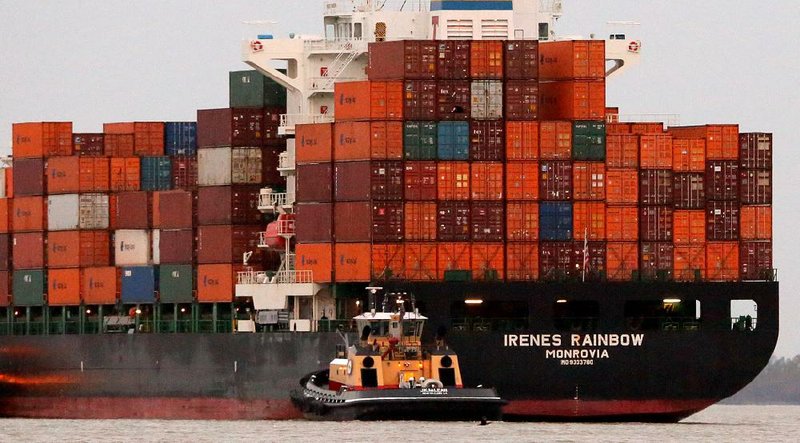Dockworkers and their employers reached a tentative agreement on royalty payments Friday, averting a strike that would have shut down U.S. ports from Maine to Texas for the first time in 35 years.
The International Longshoremen’s Association and the U.S. Maritime Alliance will continue negotiations for another 30 days, according to the Federal Mediation and Conciliation Service, which was working with the two groups. A strike would have closed ports that handle about 45 percent of U.S. commerce.
The deal relieves pres-sure on retailers and manufacturers that had braced for interruptions of shipments from frozen foods to clothing and car parts. Talks between the dockworkers union and the Maritime Alliance, whose members include container carrier companies, collapsed last week amid a dispute over container royalty fees, or levies on shipments that supplement wages.
“The agreement on this important subject represents a major positive step toward achieving an overall collective bargaining agreement,” George Cohen, director of the mediation service, said in a statement. “While some significant issues remain in contention, I am cautiously optimistic that they can be resolved in the upcoming 30-day extension period.”
The deal also allows President Barack Obama, who has faced pressure to block the strike, to avoid invoking a 1947law that unions view as antilabor. The Taft-Hartley Act empowers the president to intervene by seeking a court injunction for an 80-day cooling-off period in strikes that create national emergencies.
The union and employers began negotiations in late March and reached tentative agreements in July on issues involving new technology and union jurisdiction over work on chassis used for cargo.
Talks between the two sides broke down after the alliance sought to cap container-royalty payouts it says totaled $211 million last year, or an average of $10 per man hour. The International Longshoremen’s Association called the fees “untouchable” and vowed to strike if a new deal wasn’t reached before its contract expired today.
Cohen, who declined to describe the payment agreement in more detail, said the dockworkers and their employers have now agreed to hold talks through Jan. 28.
“This is not just another kick-the-can resolution,” David Ross, a Baltimore-based analyst at Stifel Financial Corp., wrote in a note Friday. “This news makes the strike much less likely than before.”
The maritime alliance declined to comment beyond the statement from federal mediators. Jim McNamara, an International Longshoremen’s Association spokesman, didn’t immediately return telephone messages seeking comment.
“Neither party really wants a strike and they realize the cost of a strike,” said Gary Chaison, a professor of industrial relations at Clark University in Worcester, Mass. “This is not a strike at a little manufacturing plant.This is a strike that has huge ramifications for the labor movement, for the economy, for everything.”
If a strike had occurred, workers wouldn’t have moved containerized cargo, including frozen foods and household goods, International Longshoremen’s Association President Harold Daggett told union members in a Dec. 19 letter. Passenger ships, military cargo, containerized mail, bulk items, finished autos and perishable items with a “limited shelf life” would still have been handled, he wrote.
With more than half of the nation’s containerized shipments passing through East Coast and Gulf Coast ports, a strike would have affected imports and exports accounting for $454 billion of U.S. trade in 2011, according to data compiled by Jock O’Connell, international trade adviser for Los Angeles-based Beacon Economics LLC.
“This was going to be a disaster,” John Martin, an economist at Martin Associates in Lancaster, Pa., said Friday. “I think all parties realized it was unacceptable. They knew this couldn’t happen” because it would hurt the economy too much.
Home Depot and Lowe’s had the most at stake among retailers facing a dockworkers’ strike, said Jonathan Gold, the National Retail Federation’s vice president for supply-chain and customs policy. The retailers “would be hit far and wide from apparel to home goods to patio furniture to barbecues,” Gold said.
While most retailers have their biggest quarter in the months leading up to Christmas, Home Depot may generate 28 percent of its annual revenue in the second quarter as consumers stock up for home and garden projects, according to analysts surveyed by Bloomberg. Lowe’s may get 29 percent of its revenue in the period, analysts estimate.
The immediate cost to East Coast and Gulf Coast ports would have been $45 million to $50 million a day if the strike had occurred, Martin said. That estimate covers only the lost business from moving containers in and out of ports, not secondary costs such as railroad cars stacking up or rerouting shipments to other ports, he said.
“While a contract extension does not provide the level of certainty that retailers and other industries were looking for, it is a much better result” than a strike, Matthew Shay, president of the National Retail Federation, said in a statement. “A coast-wide port shutdown is not an option. It would have severe economic ramifications for the local, national and even global economies and wreak havoc on the supply chain.”
The Longshoremen also would have been hurt, with a walkout costing its approximately 15,000 members almost $5 million in wages and benefits for each day of work stoppage, the employers’ group said in a Dec. 21 statement. It would have had “dire consequences” for more than 500,000 non-International Longshoremen’s Association members whose jobs depend on the ports, according to the management group.
Carl Chiofolo Jr., a union member and clerical worker at New Jersey’s Port Elizabeth, said he was pleased with the development.
“I would rather a 30-day extension than a strike or a lockout at this point,” Chiofolo said. “It’s better for the country. It’s better for the ILA.” Information for this article was contributed by Chris Burritt of Bloomberg News.
Front Section, Pages 1 on 12/29/2012

